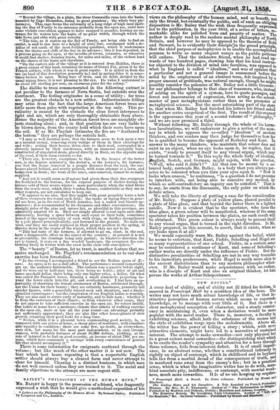BAILEY'S PHILOSOPHY OF THE HUMAN MIND. *
'Mn. Rimer is happy in the possession of a Mend, who frequently expressed a wish that he would give a methodical exposition of his
* Letters on the Philosophy of the Hunan Hind. By Samuel Bailey. Published biLongman and Co„ London. views on the philosophy of the human mind, and so benefit, not only the Mend, but eventually the public, and of such an ob • disposition is Mr. Bailey that the _wish thus frequently express led to the publication, in the year 1855, of a series of letters, re- markable alike for polished form and paucity of matter. The author is deeply read in the modern mental philosophy of North Britain, and however he may be opposed to the theories of Reid and Stewart, he is evidently their disciple:in the grand prinei le that the chief purpose of metaphysics is to enable the accompli penman to write as many elegant essays as the public patience will endure. That the unknown friend when he had read up- wards of two hundred pages, showing hfin that his kind insssee.
tor objected to the division of mind into faculties, was opposed i to what n England is called "idealism," and was of opinion that
a particular and not a general image is summoned before the mind by the employment of an abstract term, felt inspired by a proper amount of gratitude, was natural enough, though he might possibly consider the polemios of Mr. Bailey not a little tiresome. for our philosopher belongs to that class of reasoners, who, instead of seizing on the spirit of a system, love to quote passages, and ferret out inaccuracies of expression, thus acting as the school- master of past metaphysicians rather than as the promoter of metaphysical science. But the most astonishing part of the story is, that when Mr. Bailey had finished his letters his friend asked for another series exegetical of the first. The result of this request is the appearance this year of a second volume of " philosophy," and we are now promised a third.
Without following Mr. Bailey through the whole of his harm- less lucubrations, we will endeavour to give a notion of the man- ner in which he opposes the so-called ' idealism " of modern thinkers and our readers may then judge for themselves how far he is qualified to become the opponent of Berkeley and Kant. In answer to the many thinkers, who maintain that colour does not exist in an object, when no eye looks upon it, he replies, that it exists, "ready to present itself to any visual organ, which may be turned towards it." To this reply the whole body of idealists, jinglish, Scotch, and . German, might rejoin, with the question,
.Well, who said it didn't ? " All that can be meant by a co- loured body, contends Mr. Bailey, is a body that you always per- ceive to be coloured when you turn your eyes upon it. "How it looks when unseen," he continues, "is a question I do not pressen° to interfere with, not being able to conceive any method, hy which so self-contradictory an inquiry can be satished." That 113 to say, he omits from the discussion, the only point on which the debate arises.
We will take the liberty of putting a case for the consideration of Mr. Bailey. Suppose a plate of yellow glass, placed parallel to a plate of blue glass, and that beyond the latter there is a lighted candle. Now it is evident that to the spectator, who faces the blue glass, a green colour will be manifested, whereas if the same spectator takes his position between the plates, no such result will be obtained. This green colour is always ready to present itself to any visual organ, that is turned in the right direction. Is Hr. Bailey prepared, in this account, to assert, that it exists, when no eye looks upon it at all ? We would especially warn Mr. Bailey against the belief, which he seems to entertain, that Kant, Fichte, Sohelling and Hegel are so many representatives of one school. Fichte, in a certain sense may be considered a continuer of Kant, and some of Sehelling's earlier works are directly under the influence of Fichte. But the distinctive peculiarities of &haling are not in any way traceable to his immediate predecessors, while Hegel is much more akin to the ancient dialecticians than to any modern philosopher what- ever. If Mr. Bailey would make acquaintance with an author, who is a disciple of Kant and also an original thinker, let him peruse the works of Arthur Sohopeuhauer.


























 Previous page
Previous page